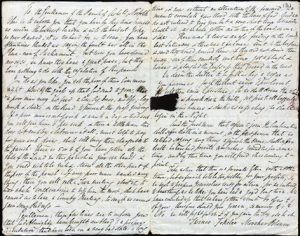We Shall Begin in the Night
On Sunday 19th May, 1816, Reverend Bartholomew Edwards discovered a letter that had been left on the driveway of Ashill Rectory, which today is known as The Glebe. It was addressed to “the Gentlemen of the parish of Ashill, Norfolk” who, 30 years earlier in 1786, had enclosed 1986 acres of common land.
This is to inform you that you have by this time brought us under the heaviest burden and under the hardest yoke we ever knowed; it is too hard for us to bear; you have often times blinded us by saying that the fault was all in the Place-men of Parliament: but now you have opened our eyes, we know they have a great power, but they have nothing to do with the regulation of the parish.
You do as you like, you rob the poor of their commons right, plough the grass up that God send to grow, that a poor man may feed a cow, Pig, Horse, nor Ass; lay muck and stones on the road to prevent the grass growing. If a poor man is out of work and wants a day or two’s work you will give him 6d per week, and then a little man that does not employ a labourer at all, must help pay for your work doing, which will bring them chargeable to the parish. There is 5 or 6 of you have gotten all the whole of the land in this parish in your own hands and you would wish to be rich and starve all the other part of the poor of the parish. If any poor man wanted anything, then you will call a Town meeting about it, to hear which could continue to hiss him the most, which have caused us to have a county meeting, to see if we cannot gain some redress.
Gentlemen, these few lines are to inform you that God Almighty have brought our blood to proper circulation, that have been in a very bad state a long time, and now without an alteration of the foresaid, we mean to circulate your blood with the leave of God. And we do not intend to give you but a very short time to consider about it, as we have gotten one or two of the head, on our side. There was 2 cows and an Ass feeding on the road last Saturday, and there was 2 farmers went to the keepers and said they would pound them, if they did not drive them away, one of them candidly went home, got a plough and horses, and ploughed the grass up that growed on the road.
We deem the miller to be full as big a rogue as you farmers for the wheat raise 1s per Comb. He will then raise 2d per stone; so we drive the whole before us and knock down the Mill and set fire to all houses and stacks as we go along: we shall begin in the Night.
And the first Man that refuses to join the Combination shall suffer death in a moment, or the first person that it catched saying anything against the same, shall suffer death. We have had private ambushes around us for some time, and by this time you will find it is coming to a point.
Take notice that this is a private letter wrote at this time but we fear it will be too public for your profits; so we wish to prepare yourselves ready for action; for we intend to have things as we like; you have had a good long time. We have counted up that we have gotten about 60 of us to 1 of you; therefore should you govern, so many to one? No: we will fight for it and if you win the day, so be it.
Swines, Fokelee, Moocher
This letter appeared between two significant events, both part of the larger Bread Riots that were raging throughout England at the time: the 16th to 18th May riots in Norwich and the Downham Market food riot on 20th May.
It represents a raw and detailed example of the rage that many rural poor throughout the country were feeling at the time, where not only was land being concentrated into the hands of the wealthy few but workers were increasingly being exploited commercially by the likes of the “full as big a rogue” miller.
The letter was despatched to Home Secretary Henry Addington, 1st Viscount Sidmouth, due to its connection with the upheavals of the time as well as its insurrectionary proposals – punishable by death – but the author(s) were never apprehended.
Tags: 1816, anarchism, anarchy, ashill, history, insurrection, norfolk, rural working class
